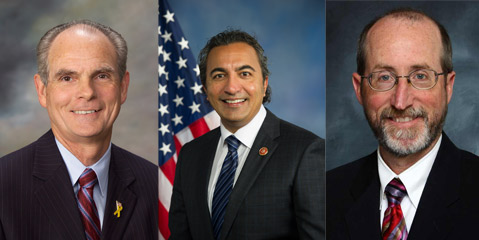Democrats Practice Self-Destructive Politics
They're Battering Moderates in Their Own Party in California and Across the Nation

Of the 7.7 million animal species on Earth, a tiny number — think bullfrogs, the praying mantis, the great spotted cuckoo, and chimpanzees — eat their own kind.
Now add to the list the Liberal California Democrat.
In recent months, the state’s dominant faction of Democrats, with brethren across the nation, increasingly has besieged and censured moderate members of their own party for bucking organized labor’s line on just a few issues, while hewing to it on most.
The efforts by liberal Democrats seem eerily similar to those undertaken by Tea Party Republicans during the early years of President Obama’s administration, when the right wing began to purge the GOP of moderates, working to defeat incumbents they judged insufficiently conservative and, in some cases, sponsoring their own favored challengers in party primaries and conventions.
Most notably, unions recently poured millions into a failed attempt to defeat Steve Glazer, a lifelong Democratic progressive who spent years working for Jerry Brown, in a special election race for a Bay Area legislative seat, because he departed from party orthodoxy in opposing some public employee strikes. At the same time, Chuck Reed, San Jose’s Democratic ex-mayor, is under constant attack for sponsoring a proposed ballot measure giving cities the right to revise taxpayer-financed pension plans. And party leaders have condemned five centrist California House members, for breaking with unions to vote for President Obama’s trade agenda.
At the recent Democratic convention, Art Pulaski, secretary-treasurer and CEO of the California Labor Federation, vilified pro-trade-agreement Democratic incumbents, denouncing by name Representative Ami Bera of Elk Grove, who last year eked out a GOP ex-congressmember, by the underwhelming margin of 50.4 to 49.6 percent
“It’s time to call them out,” Pulaski thundered from the podium, claiming Bera “bowed to corporate interests and kneels at the altar of profits.”
“Our message is this — you’re choosing sides,” he shouted, adding that come next election, “we’ll choose sides” against Bera. “Let’s kick ass together.”
Kick ass? Really? Are there truly no Republicans to oppose in toss-up districts?
THE NOMENKLATURA: There seem to be several key reasons behind the apparently self-destructive action of the labor-liberal coalition in opposing fellow Democrats.
At one level, they are enforcing strict discipline simply because they can, in a state where Democratic power approaches hegemony. More broadly, however, the moves come at a time when unions have lost membership and influence across the nation — most significantly in Wisconsin, where Republican Governor Scott Walker has busted unions and won approval of right-to-work legislation, despite the state’s history of progressive politics and trade unionism — making the Democrats’ labor wing appear desperate to hold onto whatever vestiges of power it can. And it is a plain fact that in California, public employee unions have long been the Democrats’ number-one special-interest group, shoveling cash and other campaign resources to lawmakers in exchange for their kneejerk obeisance.
“Mindful of the millions they spend electing Democrats, the public employee unions expect legislators to act like the old Soviet-era nomenklatura, compliant toadies who do what they are told,” said Tony Quinn, a former GOP political consultant who now coauthors The Target Book, a comprehensive collection of data on every district in the state. “So when one gets out of line, it’s a big deal.”
But several trends, beyond Glazer’s convincing victory, suggest the strategy in California is shortsighted.
The Top Two primary system has created a friendlier political landscape for pro-business Democrats, plus incentives and openings for traditionally Republican interests, like the Chamber of Commerce, to gain favor with them through campaign backing; with the loss of partisan primaries, moderate Democrats can now succeed by courting independents and some Republicans, as Glazer proved in his successful state Senate district race.
Also, recent polling suggests widespread unhappiness with financial packages for public employees: More than eight in 10 registered voters said that money spent on public pension or retirement systems is either a big problem (43 percent) or somewhat of a problem (39 percent) in a Public Policy Institute of California survey done last year.
None of which seems to matter to Democrats attacking their own.
On election night, within hours of the magnitude of the moderate Glazer’s special election victory over his union-backed rival becoming clear, a spokesperson for an independent expenditure committee financed by labor said they would immediately challenge the winner, in next year’s election.
“This election was not about the soul of the Democratic Party,” he said. “It was a craven political strategy designed by corporate special interests and Republicans to clear the field of credible Republican candidates and then spend record amounts of money to keep Democrats away from the polls.”
No word yet on the craven political strategy designed by labor special interests and Democrats.
Editor’s Note: This story was revised to note that Chuck Reed is the former mayor of San Jose.



